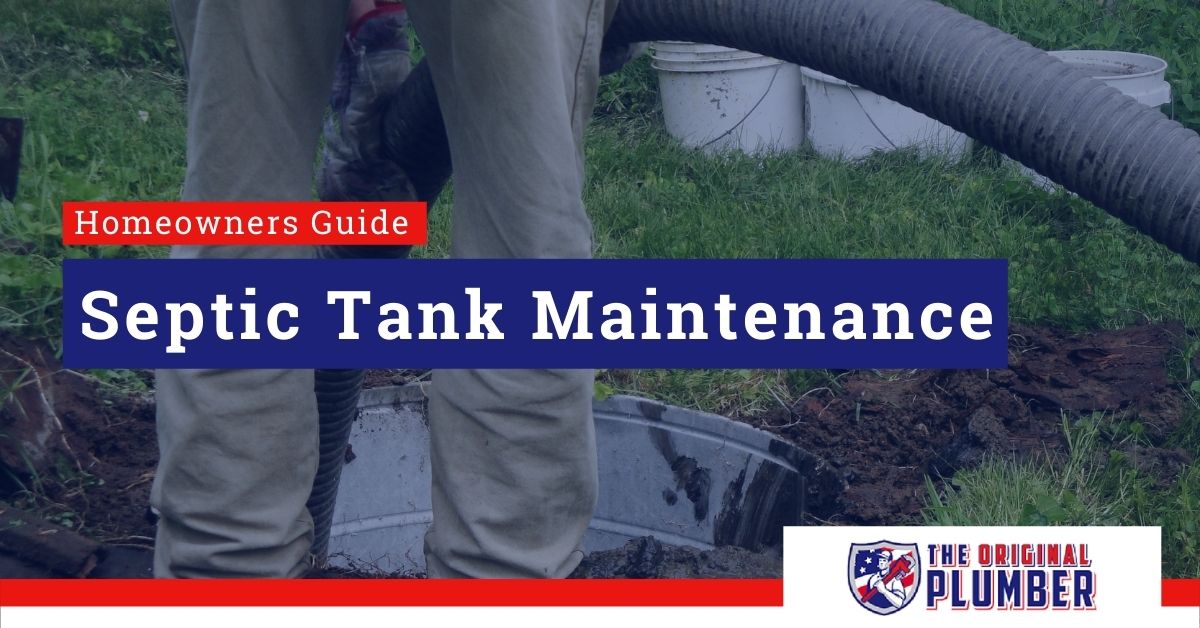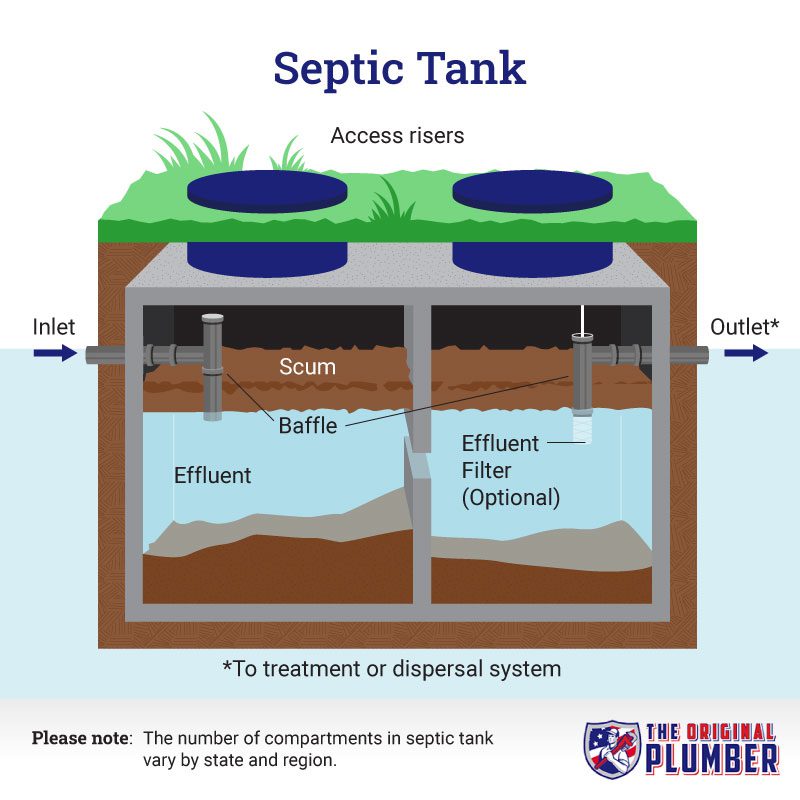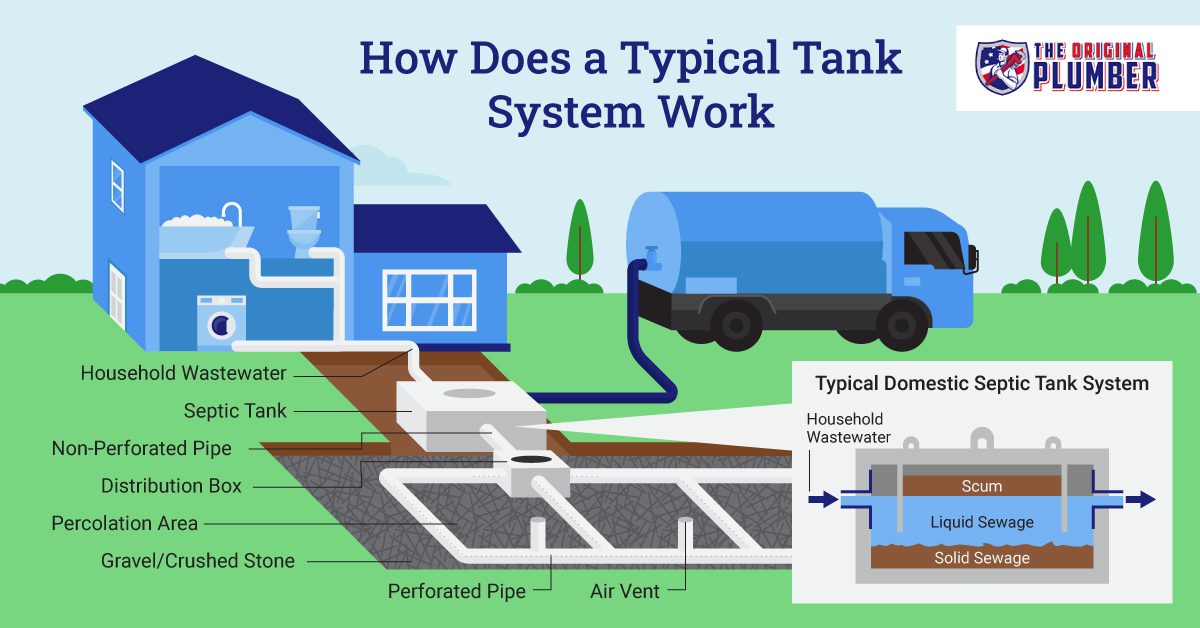Whether you just bought a home (and realized you have a septic tank) or you’ve had one for years, the best thing you can do to keep it functioning properly is to perform regular septic tank maintenance! With proper maintenance, a septic system can last for up to forty years.
What is a Septic System?
Before we jump into tips for maintaining your septic tank, let’s cover the basics. General household waste, such as bathing, washing dishes, and flushing the toilet, leaves your house as contaminated water. All those wastewater flows from your home are unsafe to drink or even handle. But it has to go somewhere, and that’s where a properly maintained septic system comes in.
How Your Septic Tank Works
A septic tank is a tank that is typically made from plastic or concrete material and can hold between 1,000 to 1,500 gallons on average. The process in the septic system allows the wastewater from your house to flow into the tank. From there, a settling process occurs, and the solid matter separates from the water. Thanks to naturally occurring bacteria, the solid waste, or sludge layers, are broken down over time. The excess filtered water or “effluent” exits the tank through perforated pipes and a drain field. Meanwhile, the heavy waste continues to degrade inside the tank.
Why Do I Have a Septic Tank?
The most common alternative for homes that are not connected to the city or county sewer system is a small community cluster system or septic tank. You likely have a septic tank because you’re not close enough to an existing utility system, or the house was not connected when the system was installed. The septic tank is a solution to process and dispose of wastewater from your home efficiently.
Septic Tank System Maintenance Tips
If you have a septic tank, the best thing to do is perform routine maintenance to keep it in working order and extend the useful life as long as possible. Below are twelve tips to get started.
Regularly Pump Your Septic Tank
Did you know that pumping your septic tank is part of routine maintenance? During the pumping process, the tank is emptied of the sludge and scum that has accumulated over time. When a tank is not emptied routinely, the sludge can build up, leading to contamination and, in some cases, septic system failure.
In general, your septic tank should be pumped approximately every three years, although this varies based on the tank size, size of your family, and the gallons of water and wastewater that you use. Excessive use will lead to having the tank pumped more often. And according to the Environmental Protection Agency, tanks with pumps or mechanical components and electrical float switches should have more frequent maintenance to remove sludge.
Keep in mind that regardless of the last time your system was pumped, if you hear gurgling water, notice your drains are taking a long time, see large volumes of standing water around your tank, have a sewer backup, or smell foul odors in your backyard, you may have a full tank. Click here to learn more about the signs that it’s time for a septic tank cleaning.
Inspect Your System for Leaks
Regularly checking for leaks can be a great way to spot a problem early and prolong the life of your tank. Leaks are generally caused by a clog, overflow, or broken pipe. One way to spot a problem can be to look at the drainfield area. A soggy yard, overgrown vegetation (or even lush vegetation), and standing excess water are all signs that your septic system may be clogged and/or leaking. If you notice any of these signs, especially when accompanied by strong smells, it’s time to call a septic professional to investigate.
Clean or Replace Your Effluent Filter
Your effluent filter helps you avoid clogged drainfield pipes, and as such, they should be cleaned or replaced regularly. These screens help filter effluent water when it exits your septic tank, so when they fail or get clogged, it can lead to more significant septic system problems. The best time to clean or replace your effluent filter is during regular tank maintenance because the septic system works best as a unit that is properly inspected and cleaned on a routine basis.
Use a Bacteria Additive
While not necessary in a properly functioning septic system, there are bacteria additives that you can add to your tank to help promote bacteria growth, which leads to the breakdown of solids. In some cases, unnatural substances like bleach and harsh cleaners can kill the microorganisms necessary to keep your system healthy. Eliminate flushing these items down the drain as much as possible.
If you decide to use additives, check with your local municipality as some products may be prohibited. We recommend asking your local professional or septic service provider for recommendations on what products to use and avoid.
Make Sure Septic Tank Lids Are Closed
Septic tank lids should always be kept closed and secure. Dislodged or broken covers can become a safety hazard. Unsealed septic tank lids can also allow surface water and dirt to get inside the tank, which can create a problem and reduce the life of your system.
If you notice a tank lid that isn’t adequately secured or may appear cracked or damaged, reach out to local service professionals who can inspect your septic system and, if necessary, make the required septic tank system repairs.
Maintain Your Drainfield
Your drainfield is an integral part of septic systems and should be adequately maintained. For septic tanks to work effectively, the drainfield area shouldn’t become saturated, which means you don’t want to overwater the site or have any sump pumps, roof drains, or rainwater drainage systems that might spill onto the area.
Additionally, never park any cars on your drainfield or plant trees nearby. Cars can add unnecessary weight that can cause damage, and tree root systems can make their way into drainpipes, causing major problems.
The last way to maintain your drainfield is to have your tank pumped regularly so overflows and backups don’t affect the health of your overall septic tank system.
Inspect Your DrainField For Clogs
Drainfield (or leach field) clogs can usually be avoided with proper system maintenance, but just in case, a routine inspection can keep more significant problems away. If you notice gurgling water sounds, bad smells, or slow drainage and backups, your leach field might have a clog. You can take a walk around your leach field as a way of inspecting it closer. Soggy grass or standing water are signs that you may have a problem and should call a professional to perform system maintenance or repairs.
Properly Dispose of Waste
Properly disposing of waste is a huge step that you can take to keep your septic system in working order. Below are a few household items that can affect your septic system (some of which may surprise you)!
Toilet paper
All toilet paper will eventually break down in your septic tank, but choosing a biodegradable option can speed that process up!
Feminine hygiene products
Feminine products like pads and tampons should never go down the toilet because they can quickly clog your septic system and speed up the need for septic tank pumping. Instead, dispose of all feminine items in a trash can.
Paper towels
Paper towels, baby wipes, and washing clothes do not break down quickly and should not be sent down the septic system.
Cat litter
Cat litter is meant to absorb liquids, and sending it through your septic system can cause problems. Additionally, cat waste can have a negative environmental impact due to a parasite that can affect wildlife (and, in some cases, humans). Dispose of cat litter in the trash, not down the toilet.
Cooking oil
Both cooking oil and cooking grease can cause clogs in your septic tank, so never send either down garbage disposals or your kitchen sink. Instead, pour grease into a container or empty food can. The grease will harden and can then be thrown out with the regular trash.
Dental floss
Dental floss may be a surprise, but its strength and size can combine to cause big problems in your septic system. Not only can it bind larger items together, but it can also get caught up around motors, pipes, and more.
Cigarette butts
Although they are small, cigarette butts don’t decompose. They can sit at the bottom of your septic system, requiring your septic system to be inspected more frequently than normal. And if you think sending them down the garbage disposal might help, think again. Garbage disposal is designed for organic materials and is no match for cigarette butts that can expand and cause clogs easily.
Coffee grounds
Coffee grounds can upset the pH balance in your septic tank, thanks to their high acidity. Instead of sending the grounds down the drain or garbage disposal, put them in the trash or use them outside as fertilizer!
Household chemicals
While household chemicals like bleach, antibacterial soaps, and drain cleaners might seem like good items to go down your drain, all of these chemicals can kill good bacteria that septic systems need to function correctly. Do your best to limit the number of chemicals you send down the drain. If faced with a small clog, use a drain snake or boiling water to try to clear the pipe rather than chemical drain openers or chemical additives.
Use Water Efficiently
The average household septic system can handle the typical amount of water used by a family. But increased or excessive water usage can mean that the sludge, liquid waste, and scum layer don’t have time to separate as they should. Washing machines, long showers, hot tubs, and all sorts of daily activities can waste gallons of water that go right into your septic system. Efficient water use helps save water and decreases the need for more frequent septic system maintenance.
Be mindful of all the wastewater that might be going down your drain and look for ways to conserve water, such as using high-efficiency toilets, a high-efficiency washing machine, and adjusting daily habits to avoid excess use.
Keep Accurate Maintenance Records
Regularly inspect your septic system and maintain frequent pumping to keep your septic system working. When you do so, keep accurate maintenance records, which can help you keep track of your septic system age, condition, and needs.
Avoid flushing anything down the toilet
You might be surprised what people have flushed down the toilet, much of which results in more frequent pumping of the septic tank. We covered the basics tips under the disposing of waste section, such as never flushing feminine hygiene products, baby wipes, cat litter, and more. But if you have young children, you may want to protect the toilet from unexpected items such as toys that can damage your pipes and clog a toilet. If you accidentally drop something in the toilet, don’t flush it right away, as this will send the item further into the septic system and possibly make retrieval impossible.
Don’t Park Vehicles On Your Leach Field or Septic Tank
Heavy vehicles can cause damage to your leach field and septic tank, so avoid driving or parking over these areas. You may also find that your vehicle will get stuck in these areas more quickly due to the moisture from the naturally filtered water that the septic tank regularly expels.
Have a Professional Inspect and Pump the Tank
Along with all the tips we’ve covered, having your septic system inspected and septic tank pumped regularly by a professional may be the most important advice we can offer. A septic tank failure can be costly and frustrating so follow the steps we’ve outlined to extend the useful life of your tank.
Give Us A Call
If you’ve noticed any problems with your septic system or it’s time for routine maintenance, call The Original Plumber & Septic. From our offices to your home, we always put you first. And, we offer a free inspection with our septic contractors.
Frequently Asked Questions
Want to know more? Below are a few common FAQs we hear regularly.
What are the do’s and don’ts of a septic tank?
Above, you’ll find an extensive list of ways you can prolong the life of your septic system. If you’re looking for a shortlist, the best thing to do consistently is inspect and maintain your system. It’s also essential that you don’t send items down the septic system that will cause damage, such as excessive water, chemicals, kitty litter, hygiene products, diaper wipes, and more.
How do you know if your septic system is failing?
A few signs can alert you to septic tank trouble, including slow drainage, back-ups, foul odors, and standing water. Call The Original Plumber & Septic today to inspect and repair your system if you notice any of these issues.
What do I do if my septic tank backs up?
If your septic tank backs up, stop sending water down your septic system and call a professional. Your tank may back up due to a clog or because the system is full. Either way, the best thing to do is determine what is wrong so you can correct it right away.






